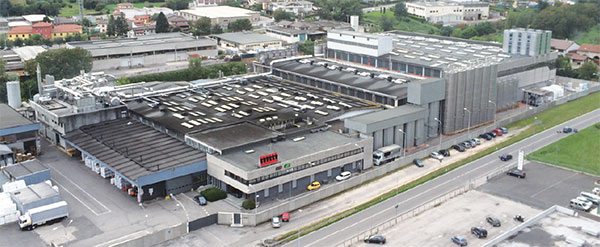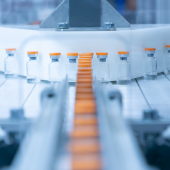An experience worth sharing
“Those” of plastic are not always “ugly, dirty and bad” (some may recall the 1976 film by Ettore Scola), as the most uninformed environmentalists would have it. This is all the more true in the case of Crocco Spa, a producer of flexible packaging that also boasts a long history of creating heatshrink films for bundles, stretch films for palletization and polyethylene cling films for use in the food sector. Stefano Lavorini
 In the hills of the central Agno River Valley, it appears that they know how to do things in their own way: elegant and efficient film printing and extrusion installations, “clean” within and without thanks to cutting-edge technology for generating and recovering energy and cutting emissions, “good” and also smart due to a virtuous cycle of redeeming and recovering processing byproducts.
In the hills of the central Agno River Valley, it appears that they know how to do things in their own way: elegant and efficient film printing and extrusion installations, “clean” within and without thanks to cutting-edge technology for generating and recovering energy and cutting emissions, “good” and also smart due to a virtuous cycle of redeeming and recovering processing byproducts.
And precisely concerning the why and the how doing business (and making profits) must be done differently, I had a chance to speak with Renato Zelcher, acting manager of the company founded by Luciana and Bruno Cocco (the latter currently the concern’s president).
I met with Mr. Zelcher at the concern’s Cornedo Vicentino facility (one of four, with a total surface area of 75,000 m2).
As a person he’s friendly and well-mannered and is - as he has always been since we both still had black hair - of an impeccable good nature, a mirror image of the concern he runs and which I had the chance to visit. I was particularly struck by the careful organization of the spaces in accordance with the flow of materials, the order, the care for the production equipment (which included one of Europe’s largest bubble extrusion installations for industrial films), the up-to-date laboratory, the unusual appearance of a solvent recovery system installed on a flexo printing machine and, even more, the brand new methane-fed trigeneration module for in-house production of electricity (meeting approximately 20% of the facility’s consumption), as well as 100% of the calories/frigories necessary for the process.

The courage to believe
With Zelcher I discussed the crisis that swept over the sector in recent years, and which left a considerable amount of rubble in its wake, and of the crisis of the market, but also that of the culture of business management strategy.
«Being on the market cannot be reduced to a mere matter of logic and common sense: if that were the case, anyone could go into business. It requires the ability to risk and invest, as well as in knowledge – related Zelcher.
«During these past few years, at Crocco we have made an effort to keep under control every aspect of the organization, with the goal of affecting the economy and competitiveness of our products. What is very important in our field is knowing how to correctly manage the flows of materials, from raw materials to the finished product and process byproducts.
Process byproducts have proven to be a valuable enough resource to convince us to create a dedicated concern, T&T, for their redemption and re-use: waste materials, systematically separated and re-processed during the production phases, are thus recovered and regenerated for re-use, or else made into cores for reels, or sold to other converters. All this with clear benefits to the environment. Like other players in the sector, we then had to face the problem of updating our supply. To this end, we specialized and equipped two sites for the production of food safe materials, particularly lamination films and polyolefin films with no chlorine or plasticizers for packaging fresh foods on trays.
Considering the wider economic context, it is likely that we have touched the bottom, and we are thus further increasing our investments: in addition to the trigeneration plant, which went into operation in late 2014, we are installing a new Windmöller & Hölscher 5-layer coextrusion line for the production of polyolefin films that will enable us not so much to enhance our production capacity as to optimize and pursue the development of ever-increasingly high performance products. Put quite briefly, significant and systematic attention to updating our means of production and research & development operations, as well as solid relationships with research universities, are the lynchpins on which we have built our competitive advantage».

Knowledge and awareness
In any case, it seems insufficient in today’s world to simply do better what has always been done. Rather, it has become indispensable to delve further into the essential elements of one’s business.
This involves first of all recourse to the tool of certification, which imposes a critical assessment and a process of continual improvement, which has now been established as a tradition at Crocco (the concern was among the first in the sector to obtain ISO 9001, ISO 14001 and ISO 18001 certificates).
But also developing new programs: «We not only asked ourselves - Zelcher recounts - about the general quality of our offer compared to alternative solutions, but are also conducting careful research on the life cycle of our main products (LCA analysis) in order to assess their environmental impact, understand their advantages and disadvantages, and basically enhance our general awareness of what we do.
A dash of humility is required in order to move forward. We are a family concern with more than 100 million euro in turnover that in any case has to know how to take steps according to its own capacities. In terms of commercial organization, we are well-structured in Italy with direct partners specialized by product and agents in different regions. Exports exceed 40% of revenue, with a strong focus on the markets of greater Europe.
Since 2008, moreover, we have had a site in Germany, with offices, a warehouse and a division for cutting and rewinding materials (second processes) and a staff of about 25. This has proven a very positive experience that we would like to replicate in other countries as well.
On the other hand, the share of the concern’s exports to emerging or distant markets is limited to approximately 5% of turnover, both due to concrete obstacles having to do with transport and those to do with the risk of exchange. However, we consider this distributed presence worldwide strategic to having a global vision of the market».
Coco Chanel said that nature gives us the face we have at twenty, but it’s our job to earn the one we will have at fifty.
Crocco, now approaching the milestone of fifty years in business (in 2017), seems to have had this well in mind for some time, taking care not only of appearances but also proactively renewing itself in profound ways from within.

|
Quantity and quality Crocco reports a production of 50,000 tons/year of flexible packaging. Although the standard measurement for production capacity continues to be in tons, for the packaging sector it would be more appropriate to consider m2 and linear meters. Indeed, especially in recent years, constant developments have led to a drastic reduction in film thicknesses. While on one hand this has significantly reduced volumes in tons, at the same time this has enabled Crocco to maintain if not increase its production in terms of m2. An example par excellence is a film for bundling mineral water bottles that went from a thickness of 65-70 my to as low as 30-35 my. At the moment, approximately 45% of the concern’s production is represented by neutral and printable heatshrink films, 30% by stretch films for palletization and the remaining 25% subdivided among stretch covers, technical films and stretch films for food products. The production technologies are 3: extrusion, bubbles, up to 5 layers; flat die extrusion (cast), up to 5 layers; and flexographic printing, up to 10 colors. The concern utilizes approximately 100 different types of resins, for a total of more than 5000 product codes. It has 4 production sites, 2 of which specialized in materials for the food sector, covering a total surface area of 75,000 m2: the site and headquarters is located in Cornedo Vicentino (VI). «This site - explains the technical manager, Giuliano Dalla Via - houses one of Europe’s largest industrial bubble film extruders. It’s a three layer Dolci (adapted and modified), capable of simultaneously producing 4 reels with a width of 1500 mm each». |




















